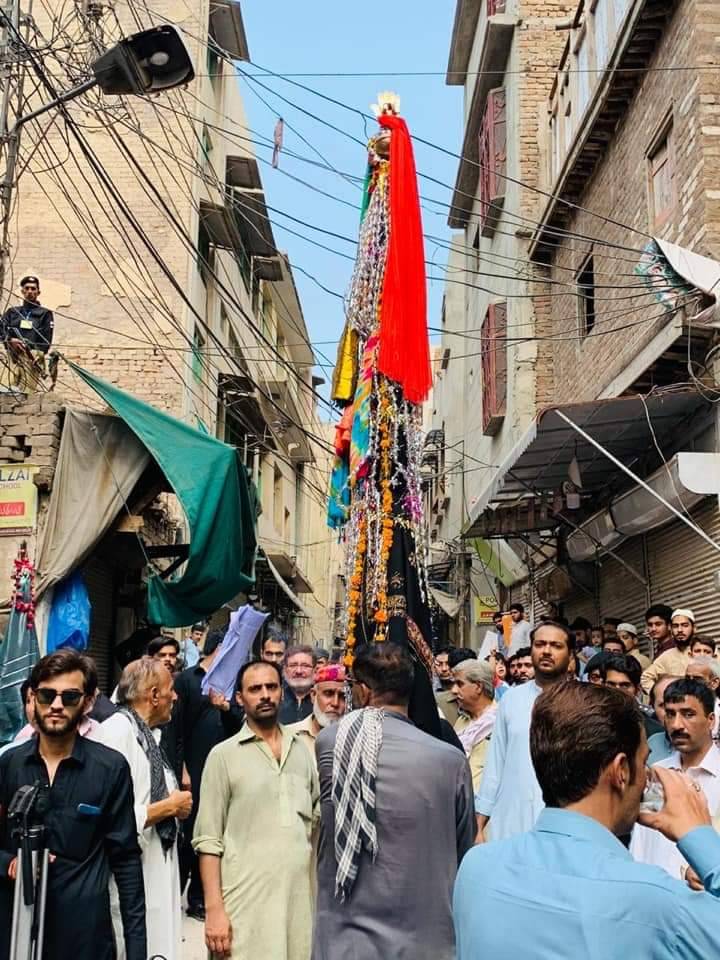
Thousands of mourners gathered at different locations on Monday morning in Peshawar to participate in the Muharram 9 processions and commemorate the tragedy of Karbala.
The main Ashura procession commenced from Imambargah Sain Zareen, Imamia Colony, Gulbahar at 4 PM on Monday. Dozens of small and big alam and tazia processions converge into the main procession at various points.
After passing through its traditional route inside the walled city and adjacent areas, the Grand Trunk Road, the main procession will return to Imamia Colony at 4am on Muharram 10. The Zuljinah, tazia and alam processions began from different imambargahs of the city after Zuhr prayers.
12 processions were taken out from different imambargahs in the old city and passed through Qissa Khwani Bazaar, Karimpura, Jehangirpura, Gunj, Shaheen Bazaar, Debgiri Bazaar, Church Road, Chowk Yadgar, Kohati Chowk, Ashraf Road and other narrow streets.
Pashto, Seraiki and Dari-speaking migrants from other parts of Khyber Pakhtunkhwa (KP) and Afghan refugees who live in Peshawar conducted the majlis in their native languages.
Akhunzada Muzafar Ali, secretary of the Muharram committee, says that Peshawar has 93 imambargahs, majority of which were established before creation of Pakistan, with 63 of them still operational. He further told that Babul Hawaij in Jehangirpura is Peshawar’s oldest imambargah.
A unique aspect of Ashura in Peshawar is that the majlis are conducted in six different languages: Urdu, Pashto, Hindko, Persian, Punjabi and Seraiki. Multilingualism and cultural diversity is reflected in Ashura processions and majalis in the provincial capital.
“One can see a mix of Iranian, Afghan and Indian culture in the majalis and azadari processions in Peshawar,” says Ali, a participant of the procession.
Most of the zaakireen or narrators who conduct majalis have studied in Lucknow, Iran and Iran. 12 different processions will also be taken out on 9th and 10th Muharram from different imambargahs in Peshawar.
History of Azadari in Peshawar
The Shia community in Peshawar has been peacefully observing Muharram and Ashura for centuries. The history of Ashura procession in Peshawar is ages-old.
In his book Tareekh Azadari Peshawar, well-known zaakir (narrator) late Mukhtar Ali Nayyar stated that the first procession of Zuljinah on Muharram 10 was taken out in 1890.
Nayyar further wrote that in 1890, the then Iranian ambassador en route to Afghanistan visited an Imambargah on Muharram 10 and attended a majlis conducted in Persian.
Impressed, he asked Akhunzada Akbar Khan, a notable Shia, if there was anything he could do for him. Khan requested the ambassador to ask the then government of India to allow the Muslims to take out a Zuljinah procession in the city.
The first procession was thus taken out from Imambargah Agha Syed Alam Shah Awal and continues to date. Ashura prayers in other districts of KP also continued in tight security in which Hangu and Parachinar are most sensitive.
The main Ashura procession commenced from Imambargah Sain Zareen, Imamia Colony, Gulbahar at 4 PM on Monday. Dozens of small and big alam and tazia processions converge into the main procession at various points.
After passing through its traditional route inside the walled city and adjacent areas, the Grand Trunk Road, the main procession will return to Imamia Colony at 4am on Muharram 10. The Zuljinah, tazia and alam processions began from different imambargahs of the city after Zuhr prayers.
12 processions were taken out from different imambargahs in the old city and passed through Qissa Khwani Bazaar, Karimpura, Jehangirpura, Gunj, Shaheen Bazaar, Debgiri Bazaar, Church Road, Chowk Yadgar, Kohati Chowk, Ashraf Road and other narrow streets.
Pashto, Seraiki and Dari-speaking migrants from other parts of Khyber Pakhtunkhwa (KP) and Afghan refugees who live in Peshawar conducted the majlis in their native languages.
Akhunzada Muzafar Ali, secretary of the Muharram committee, says that Peshawar has 93 imambargahs, majority of which were established before creation of Pakistan, with 63 of them still operational. He further told that Babul Hawaij in Jehangirpura is Peshawar’s oldest imambargah.
A unique aspect of Ashura in Peshawar is that the majlis are conducted in six different languages: Urdu, Pashto, Hindko, Persian, Punjabi and Seraiki. Multilingualism and cultural diversity is reflected in Ashura processions and majalis in the provincial capital.
“One can see a mix of Iranian, Afghan and Indian culture in the majalis and azadari processions in Peshawar,” says Ali, a participant of the procession.
Most of the zaakireen or narrators who conduct majalis have studied in Lucknow, Iran and Iran. 12 different processions will also be taken out on 9th and 10th Muharram from different imambargahs in Peshawar.
History of Azadari in Peshawar
The Shia community in Peshawar has been peacefully observing Muharram and Ashura for centuries. The history of Ashura procession in Peshawar is ages-old.
In his book Tareekh Azadari Peshawar, well-known zaakir (narrator) late Mukhtar Ali Nayyar stated that the first procession of Zuljinah on Muharram 10 was taken out in 1890.
Nayyar further wrote that in 1890, the then Iranian ambassador en route to Afghanistan visited an Imambargah on Muharram 10 and attended a majlis conducted in Persian.
Impressed, he asked Akhunzada Akbar Khan, a notable Shia, if there was anything he could do for him. Khan requested the ambassador to ask the then government of India to allow the Muslims to take out a Zuljinah procession in the city.
The first procession was thus taken out from Imambargah Agha Syed Alam Shah Awal and continues to date. Ashura prayers in other districts of KP also continued in tight security in which Hangu and Parachinar are most sensitive.
